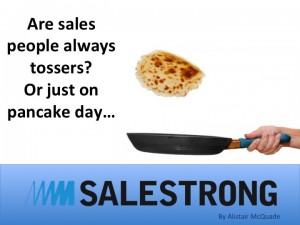I always start my sales training courses by finding out what the delegates want to achieve. Just recently I was holding an introductory sales training course and the delegates all confirmed that they wanted to lose the ‘embarrassment’ of selling. It’s hard to think of any other career that people want to go into, but are embarrassed of actually doing so??
Why the embarrassment? The delegates confirmed that it was the poor reputation that sales people enjoy. I remember listening to a game show where the panel had to create imaginary collective nouns (e.g. the collective noun for geese is a gaggle). The collective noun that they created for a group of sales people, was an ‘Aftershave of Salespeople.’ It appears that selling as a profession has a rather ‘ill-fragranced’ reputation. The Trust Project, by David J Kurlan, proposes that the least trusted sales people are car sales people followed closely by insurance sales people. Not sure a large study was needed to prove that point…
So how do we remove the odour of ‘old spice’ and breathe fresh organic alpine air onto the reputations of our sales people? Well if we look at the trust equation, put forward in the book the ‘Trusted Advisor’ by Maister, Green and Galford, trust can be built by increasing credibility, reliability and intimacy. Pull these three levers and you’ll be basking in the glory of a trusted buyer-seller relationship. But, and this is a sizeable but, there is a downside as deep as Barry White’s voice. Trust is reduced significantly by self-interest. The presence of self-interest on the seller’s side is almost guaranteed to put a cold war freeze on relations between buyer and seller. Self-interest comes from many sources but one example in sales is the commission-based nature of remuneration. Even if commission based pay does not drive self interested behavior itself, it signals to the buyer that the sales person may be watching their own self interest (bonus) more than their needs.
The conclusion Kurlan drew from his study on trust in selling, was that the mistrust between buyer and seller had its roots in the high turnover of sales staff (87% in insurance and 42% in car dealerships) and the lack of sales training they had as a result of this high turnover. Kurlan proposes that, “When salespeople are taught to be honest, put the customer first, ask questions and listen, they are taught to follow up only when it has been agreed to and they are provided with non-manipulative strategies and approaches. Unskilled and untrained salespeople are the ones that most often put themselves first, exaggerate, push and cause people to be uncomfortable.” You can see the research here.
Conclusion. Building trust is hard to do but easily lost. Retaining good sales people and training them well, will help to ensure that your most prized assets, your customers, continue to trust you and keep coming back for more.
By Alistair McQuade. Sales Force Transformation Consultant @ Salestrong

